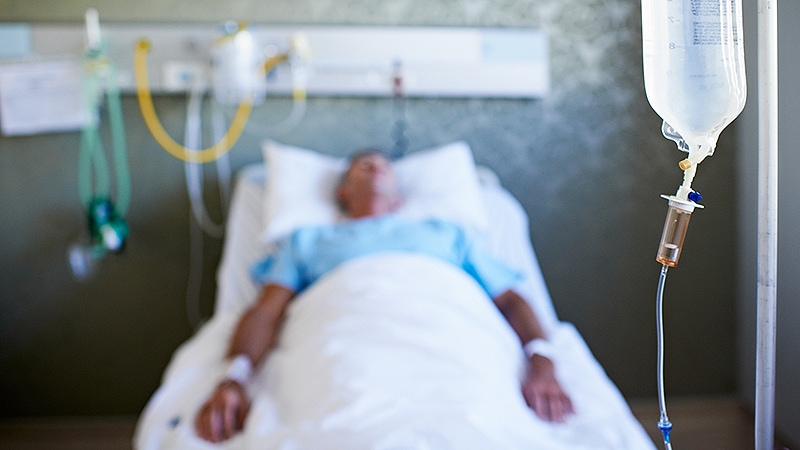
Severe infection is linked to an increased risk of substance-induced psychosis and subsequent conversion to schizophrenia, new research suggests.
Results of the large, population-based study showed any infection was associated with a 30% increased risk for substance-induced psychosis. However, with more than a threefold increased risk of substance-induced psychosis, hepatitis was the infection most strongly linked to psychosis and the only infection associated with conversion to schizophrenia.
"Severe infections are associated with an increased risk of developing a substance-induced psychosis. Furthermore, hepatitis following substance-induced psychosis is associated with an increase in the risk of conversion to schizophrenia. Both of these observations support the hypothesis of an immunological component to psychosis," write the investigators, led by Carsten Hjorthøj, PhD, MSc, Copenhagen Research Center for Mental Health, Denmark.
The study was published online February 12 in the American Journal of Psychiatry.
Mechanism Still Poorly Understood
Previous research suggests that infection increases the risk of schizophrenia, but this new study is the first to investigate the association between infection and substance-induced psychosis.
Using Danish national registry data, the researchers analyzed data on all individuals born in Denmark since 1981. Of the 2,256,779 people, the researchers identified 3618 cases of incident substance-induced psychosis.
Any infection increased the risk for substance-induced psychosis in the fully-adjusted model (hazard ratio [HR] = 1.30; 95% confidence interval [CI], 1.22 - 1.39; P < .001). The risk was doubled in the first 2 years following a severe infection and stayed elevated for more than 20 years.
Hepatitis was the infection most strongly associated with substance-induced psychosis (HR = 3.42; 95% CI, 2.47 - 4.74; P < .001) and only hepatitis predicted conversion to schizophrenia after substance-induced psychosis (HR = 1.87; 95% CI 1.07 to 3.26; P = .03).
These results, the investigators note, "mirror previous findings on the association between infections and schizophrenia, including previous observations that the link is particularly strong for hepatitis."
They also point out that the biological mechanisms through which infections would increase the risk of psychosis, including substance-induced psychosis, remain poorly understood.
"If the exact mechanisms underlying the psychotogenic properties of infections or the immune response can be identified, this is likely to lead to improvements in treatment for psychotic disorders. A further hope is that it may even be possible to use this knowledge for primary prevention of psychosis," the authors write.
Interpret with Caution
Commenting on the study for Medscape Medical News, Ole Köhler-Forsberg, MD, from the Psychosis Research Unit, Aarhus University Hospital, Denmark, said the findings support a potential immunologic link to schizophrenia.
"However," he added, "as in every register-based study, no causality can be assumed, only associations. As mentioned by the authors, there may be residual confounding and confounding by indication."
Also commenting on the study for Medscape Medical News, René Kahn, MD, PhD, professor and chair of psychiatry at the Icahn School of Medicine at Mount Sinai in New York City, noted there is a lot of "indirect evidence" from epidemiologic studies like this one to suggest an immune component to psychosis.
"However, there is not a single piece of direct evidence linking the immune system to schizophrenia so far," Kahn cautioned.
"Yes, people who have hepatitis have a higher risk of developing substance-induced psychosis, but this may be a spurious finding. It may very well be that people who are prone to hepatitis for whatever reasons are at higher risk for psychosis but there is no direct evidence that the two are related. This study doesn’t convince me at all that immune pathology is related to schizophrenia," Kahn said.
The study was supported by a grant from the Lundbeck Foundation Initiative for Integrative Psychiatric Research (iPSYCH). The study authors, Kahn, and Köhler-Forsberg have disclosed no relevant financial relationships.
Am J Psychiatry. Published online February 12, 2020. Abstract
For more Medscape Psychiatry news, join us on Facebook and Twitter
"severe" - Google News
February 21, 2020 at 07:38AM
https://ift.tt/38O3Hkq
Severe Infection Tied to Substance-Induced Psychosis - Medscape
"severe" - Google News
https://ift.tt/2OrY17E
Shoes Man Tutorial
Pos News Update
Meme Update
Korean Entertainment News
Japan News Update
Bagikan Berita Ini















0 Response to "Severe Infection Tied to Substance-Induced Psychosis - Medscape"
Post a Comment